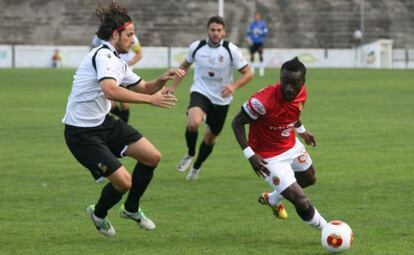Match-fixing extends its reach
Segunda B and Women’s Primera matches identified by betting analysts


Match-fixing in Spanish soccer is not limited to the professional categories, according to a trend detected by specialists in Europe. Betting syndicates are apparently now targeting the lower leagues and, perhaps most surprisingly, the Women's Primera División, where there are fewer observers and matches are easier to manipulate. The data to back these suspicions was provided this week in the European Parliament by Federbet, a Brussels-based company that provides information on matches that produce dubious betting patterns.
Included in its report was a match on November 10 between Real Sociedad and Granada in the Women's Primera División, which ended 3-0 to the home side, and the 1-1 tie played out last weekend by Constancia and Gimnàstic de Tarragona in the men's Segunda División B. These two matches constitute the Spanish contribution to a list of 51 games played in Europe, China, Indonesia and Uzbekistan, which according to Federbet were decided by less-than-fair means. Also on the list are three tennis matches, two Baltic Basketball League games and a women's European Champions League handball match.
"Our system is 100-percent accurate. We consider bets to be the same as the stock market; if an amount that should be falling suddenly starts to rise then we know that something fishy is behind it and we alert our clients before the match in question begins," said Francesco Baranca, Federbet's managing director. The Spanish Professional League (LFP) is one of those clients.
A bet of 50,000 euros was placed, which made us sit up"
In the case of the Real Sociedad-Granada game, which was 0-0 at the hour mark and, according to match reports, featured an offside goal allowed to stand and a very dubious penalty decision in favor of La Real, what caught Federbet's eye was not the number of bets on a home win but one colossal individual punt on the outcome: "A bet of 50,000 euros was placed, which made us sit up," say sources close to the case. The LFP reported the matter to the UDEF financial crimes unit of the Spanish National Police. The bet was that La Real would win by more than one goal. In addition to the two matches on Federbet's list, the LFP has identified other soccer fixtures and a basketball game as possible fixes.
Also at the European Parliament meeting was Ricardo Resta, the LFP's disciplinary committee director — "Spain is the most committed country in the world" in the fight against match-fixing Baranca said — who explained how every week the 21 matches played across the first and second divisions are minutely monitored, with access to betting movements also at hand.
"If Federbet alerts us to a possible fix, we look at all of the possibilities, such as own goals, goalkeeper errors and so on, and if any of them look suspicious we can cross-check to see if any strange betting patterns have resulted. If we conclude that a match has likely been rigged, we open disciplinary action and pass the information to the police, because since 2010 match-fixing is a crime in Spain. Bribes are soccer's biggest enemy and the LFP has declared war. The mafias have to be told that this is not fertile ground for them."
The LFP also works with players and tries to identify those that are most at risk of falling into the hands of mafia groups in Singapore, who use online betting to launder money made from narcotics, prostitution and arms trafficking.
"It tends to be veteran players on their way out who have passed through many clubs, or youngsters who are blinded by the lights of the top division," says Resta. "These are the players who should be informed that if they allow themselves to be bought once, they are sold forever."
“Dad, how can you believe this?”
The saddest moment of Bari prosecutor Ciro Angelilli’s support of his local side came when it overturned a 0-3 deficit to win a game 4-3. “I went to hug my 11-year-old son to share my joy and he turned to me and said, ‘Dad, how can you believe this? The game was fixed.’ That froze my blood, not because I doubted my team but because I saw that my son would never feel the passion for soccer as I did.”
For Angelilli, who has opened several investigations into match-fixing in Italy, the key driver of a phenomenon that threatens competitions around the world is the need of mafia organizations to launder money: “Betting, like casinos, is the perfect method. What bookmakers pay out, and they never ask where the stake came from, is as clean as a whistle.”
Roberto do Martino, a prosecutor in Cremona, explains the modus operandi. A Singapore-based kingpin controls eight bosses who have carved the world into eight operating regions. In Italy, eastern European mafias act as intermediaries and search out corruptible players, usually targeting goalkeepers and defenders; those that can influence the outcome the most. They pay up front, and if the result is not what they wanted, the money is returned.
Club officials from the competing sides are also approached to agree on a result.







































